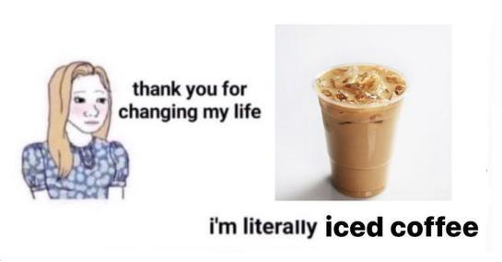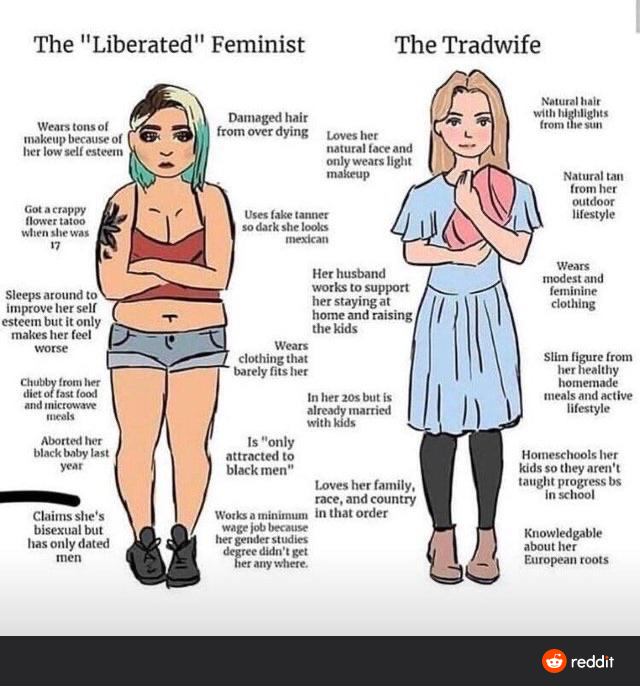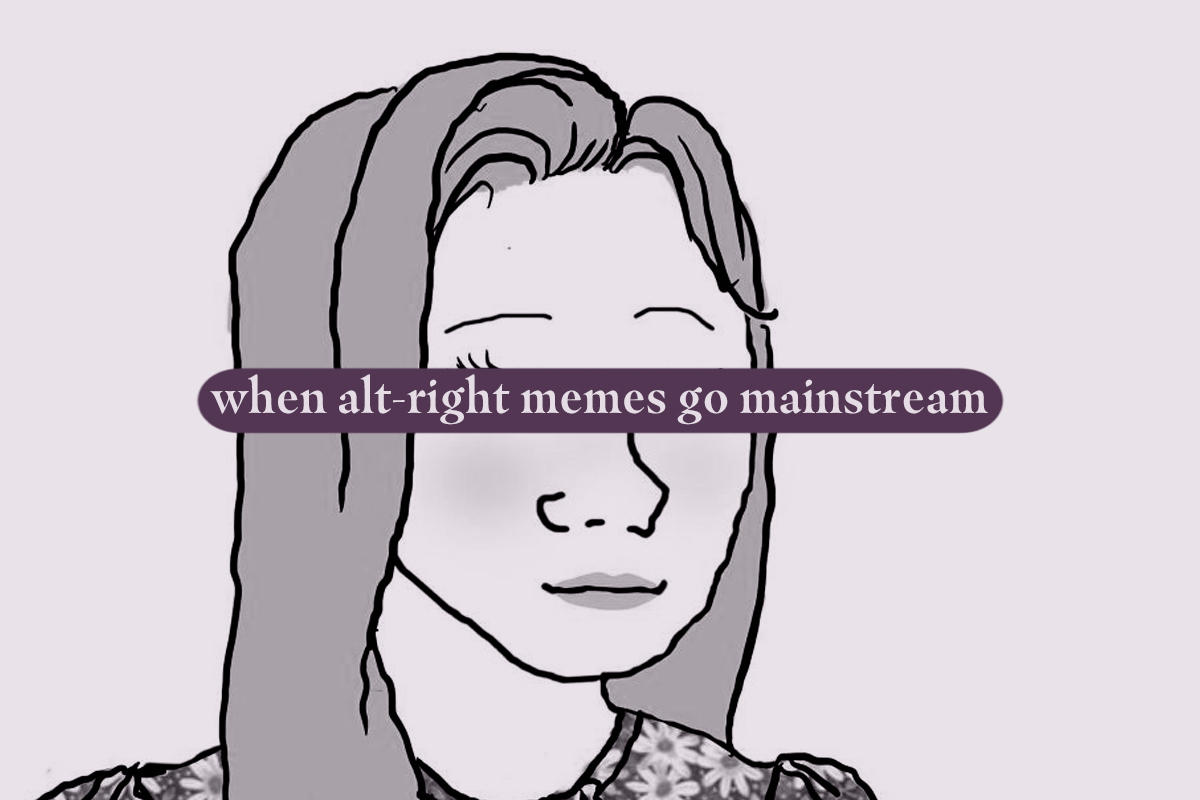You swipe through your Instagram feed and see a meme. There’s a badly drawn, blue-eyed, blonde-haired girl in a blue dress — it’s an image you recognize, though you can’t quite place it yet. The text under her says “thank you for changing my life” and next to her is an iced coffee. “I’m literally iced coffee” reads the text under it.
Okay, sure, it’s a funny meme, iced coffee can be life-changing. However, there’s a nefarious, antisemitic history to this meme — and understanding its history is important to understanding how white supremacists operate on the internet. Let’s break it down.
What is the meme?
The blue-eyed, blonde-haired girl is supposed to represent a “tradwife,” or traditional wife: a group of real conservative women who celebrate holding traditionally feminine roles, following their husbands, and being white.
In one meme, she is positioned side by side with a caricature of a “liberated feminist” — the feminist being the one mocked, and the tradwife being celebrated. Circling the tradwife are traits implied to be better than those of the feminist caricature, like how she “has knowledge about her European roots” and “loves her family, race, country, in that order.”

Yikes.
This meme, known as “tradwife girl,” originated on 4chan’s politics board, titled “politically incorrect” in 2019, as a variant of similar characters like “Nordic gamer,” an Aryan man usually compared to a Mediterranean, often Jewish-coded man.
Wait, there are white supremacist memes?
Yes. 4chan, in particular, has a long history of alt-right, neo-Nazi activity — often expressed through meme formats. The original tradwife meme thread is filled with racist, misogynist, and antisemitic comments; it takes reading through about five of them to find someone blaming the “Jewish media” for their problems.
According to a report done by the Data & Society Research Institute, “Far-right movements exploit young men’s rebellion and dislike of ‘political correctness’ to spread white supremacist thought, Islamophobia, and misogyny through irony and knowledge of internet culture.” Boards like “politically incorrect,” better known as /pol/, are filled with memes like tradwife girl — images that mask violent Nazi ideas, but are passed around as ironic and edgy.
“White-nationalist and alt-right groups use jokes and memes as a way to normalize bigotry while still maintaining plausible deniability, and it works very well as a recruitment strategy for young people,” Lindsay Schubiner, program director at the Western States Center, told The Washington Post.
These images are easy to push off as “just a joke,” which is what allows white supremacist rhetoric to stay safely hidden; there’s always plausible deniability when the tools you use look cartoonish and exaggerated.
Okay, but my friend making a joke about how they love iced coffee isn’t a Nazi. It’s just a meme, so it’s not hurting anyone, right?
Well, maybe it seems trivial, but it’s a bit concerning that more and more people are letting memes with alt-right origins enter the mainstream.
Some may argue it’s possible to “reclaim” this image; by taking it out of an alt-right context and placing it into a liberal, leftist, or queer context, we can perhaps take back some of that power and make a few Nazis mad along the way.
Believe me, I’m more than up for making some Nazis mad. Reclamation can be powerful — and can work.
Remember that “not like other girls” meme that compared feminists and tradwives? That meme structure was very common a few years ago, and the format was all over the internet, as two women criticizing each other’s music tastes, or calling them “fake gamer girls” or slut-shaming, or… well, it’s mostly just based on slut-shaming. But, there’s been a new trend of redrawing those memes to show the two women in a relationship that’s really cute and wholesome. It pushes back on the kind of internalized misogyny that those memes thrive from.
Cool, so can we reclaim the tradwife meme?
That’s a bit more complicated. The tradwife meme’s origins aren’t just about internalized misogyny, but are filled with racist and antisemitic rhetoric. This can’t necessarily be reclaimed in the same way; reclaiming a term, or an image, occurs when the vulnerable people the term was used to attack step up and take it as their own. And that is simply not what’s happening here with the sudden surge of this particular meme. Instead, the tradwife is being embraced and the rhetoric she represents is completely shrugged off.
And, while we may rejoice in the idea of pissing neo-Nazis off, they tend not to care whether their jokes are falling into the hands of people that oppose them. Their goal is to allow ideas seen as extreme to enter acceptable political discourse. They want their ideas to be spread to the mainstream, and internet memes have become very effective tools to do so. As that Data & Society Research Institute report pointed out, “Milder images are intended to work as ‘gateway drugs’ to the more extreme elements of alt-right ideology.”
The tradwife girl may seem harmless, and that’s because it’s designed to be.
TL;DR?
The tradwife meme seen going around is not “just a joke,” but a clear example of alt-right, racist, and antisemitic tropes entering the mainstream online discourse. And that isn’t funny at all.



